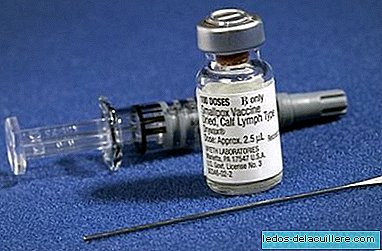
Vaccines are very safe, since the probability of producing an undesirable effect of importance is so low that, under normal conditions, it should not influence the decision to vaccinate or not. However, there are some side effects that are common after receiving a vaccine.
As a result of vaccination, most of the adverse effects produced are mild and transient and are limited to temporary pain or swelling.
Swelling, redness or swelling at the puncture site. It is a relatively frequent and transient reaction that can be treated by the local application of a cold compress. If pain is important, an analgesic such as Paracetamol or Ibuprofen can be used, provided we have consulted with the pediatrician.
Sometimes it may be a small hard lump that appears at the puncture site and disappears spontaneously after several days. It occurs especially after vaccination against pertussis.
Fever It is another usual reaction. Almost any vaccine preparation can cause fever after administration but occurs more frequently after the triple viral vaccine (measles-rubella-mumps) and after vaccination with DTPe (diphtheria-tetanus-pertussis). In the case of triple viral vaccination, fever usually appears several days after vaccination (4 to 15 days later). If fever appears after vaccination, the child should be given an antithermal (Paracetamol or Ibuprofen) and consult with his pediatrician in case the fever is maintained for more than 24-48 hours or other symptoms appear.
The most serious adverse effects (anaphylactic reactions or encephalopathy) are very rare (approximately one case in every million vaccines given) and much less frequent than those caused by the disease we protect.
Although there are few contraindicated cases to vaccinate a child, serious adverse effects would constitute one of them. In addition, it is necessary to pay special attention and carefully evaluate each case to decide whether to administer next vaccines if following vaccination appear:
- Inconsolable crying lasting more than three hours
- Great swelling in the area where the vaccine was applied
- Convulsive crisis
The causes of adverse effects may be the vaccine itself, the preservatives that are added to keep it stable, the antibiotics that are sometimes added to prevent contamination or other substances present in some vaccines.
Before administering them to our children, it is convenient that we inform ourselves about vaccines, especially of possible adverse effects of vaccines and how to act before them.












